Rugge Surname Ancestry ResultsOur indexes 1000-1999 include entries for the spelling 'rugge'. In the period you have requested, we have the following 40 records (displaying 31 to 40): Single Surname Subscription | | | Buying all 40 results of this search individually would cost £184.00. But you can have free access to all 40 records for a year, to view, to save and print, for £100. Save £84.00. More... |
These sample scans are from the original record. You will get scans of the full pages or articles where the surname you searched for has been found. Your web browser may prevent the sample windows from opening; in this case please change your browser settings to allow pop-up windows from this site. Liegemen and Traitors, Pirates and Spies
(1591-1592)
The Privy Council of queen Elizabeth was responsible for internal security in England and Wales, and dealt with all manner of special and urgent matters
RUGGE. Cost: £4.00.  | Sample scan, click to enlarge
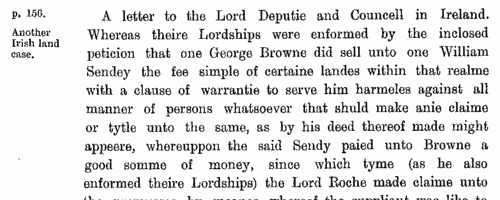
| Liegemen and Traitors, Pirates and Spies
(1591-1592)
The Privy Council of queen Elizabeth was responsible for internal security in England and Wales, and dealt with all manner of special and urgent matters
RUGGE. Cost: £4.00.  | Sample scan, click to enlarge
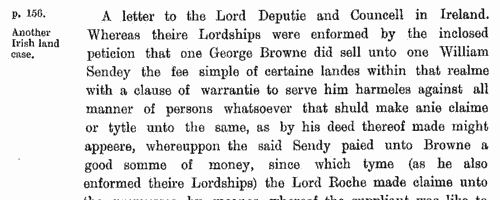
| Inhabitants of Somerset
(1607-1625)
The Reverend E. H. Bates prepared extracts from the Somerset quarter session records of 1607 to 1625 for publication by the Somerset Record Society (xxiii) in 1907. The period is covered by quarter sessions minute book 1 (1613 to 1620) and part of book 2 (1620-1627); these are based on the rolls of recognizances (taken, discharged and forfeited); criminal indictments (not touched on in Bates's extracts); and sessions rolls 1 to 16 (abstracted by A. J. Monday). The records covered and illustrated by these extracts are introduced under the heads Sessions Business; Relief of the Poor; Apprentices, Bastards and Lunatics; Charities (Alms- and Pest-Houses); Housing the Poor; Roads and Bridges; Rates and Appeals; Houses of Correction; and Drink Traffic. RUGGE. Cost: £4.00.  | Sample scan, click to enlarge
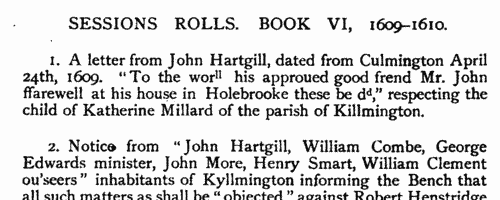
| Royalist delinquents in county Durham and Northumberland, their successors, tenants, debtors and creditors
(1648-1660)
King Charles I was executed 30 January 1649, the kingship was abolished and government by a Council of State was established 14 February 1649. Oliver Cromwell became Lord Protector 16 December 1653; died 3 September 1658; and was succeeded by his son Richard, who abdicated 24 May 1659. Charles II was established on the throne 29 May 1660. From 1648 to 1660 parliament sequestrated royalists' estates, restoring many by a process of heavy fines called compounding; this was administered by the Committee for Compounding, working through county committees. These raised considerable amounts of money, money which was vitally necessary for maintaining the parliamentary army's campaigns to subdue opposition in the three kingdoms - England, Scotland and Ireland. The raising and delivery of these monies was the responsibility of the Committee for Advance of Money (C. A. M.). The records of these committees were detailed and extensive, amounting to about 300 volumes, and were calendared for the Public Record Office by Mary Anne Everett Green. Abstracts of the county Durham and Northumberland entries were collated by Richard Welford with a manuscript transcript of the proceedings of the parliamentary commissioners in county Durham surviving in Durham cathedral library, and published by the Surtees Society in 1905. The persons named in these abstracts are not only the delinquents themselves, and those who succeeded them in their estates, but tenants, debtors and creditors, and local constables and officials of the committees.RUGGE. Cost: £4.00.  | Sample scan, click to enlarge

| Irish petitions, memoranda and correspondence
(1606-1663)
John Harley of the Historical Manuscripts Commission was invited by Reginald Rawdon Hastings to examine his family's extensive archives at the Manor House, Ashby de la Zouche, in Leicestershire. Harley produced a detailed calendar, in three volumes; Hastings himself having since died, and Harley having been killed at Gallipoli, the work was completed by his colleague, Francis Bickley, who also produced a fourth volume, published in 1947, by which time the manuscripts themselves had gone to the Henry E. Huntington Library at San Marino in California. This volume covers nine categories of the records, of which much, but not all, relates to Ireland: Correspondence of sir John Davies (Solicitor-General for Ireland 1603-1606 and Attorney-General for Ireland 1606-1619) (pages 1-17); Warrants, Petitions, &c., relating to Ireland, 1604-1618 and 1634 (18-54); Correspondence of John Bramhall (Bishop of Derry 1634-1660 and Archbishop of Armagh 1660-1663) (55-136); Petitions, Orders and Miscellaneius Documents mostly relating to the Episcopate of John Bramhall (137-152); Other Miscellaneous Irish Papers (153-185), including a particularly valuable Survey of the Undertakers and Servitors planted in Ulster between 2 February and 25 April 1613 (159-182); Royal Letters and Letters from the Lords of the Council, &c., mostly to the Earls of Huntingdon as Lords Lieutenant of Leicestershire and Rutland, and other Documents relating chiefly to County Affairs (186-221); Notes on Speeches and Proceedings in the House of Lords 1610-1621 and 1670-1695 (222-324); Later Miscellaneous and Additional Papers (325-358); and Letters and Papers of the Graham Family, chiefly relating to the disposal of the estates and titles of the Earls of Airth and Menteith and proposals for the marriage of Helen, daughter of sir James Graham.RUGGE. Cost: £4.00.  | Sample scan, click to enlarge
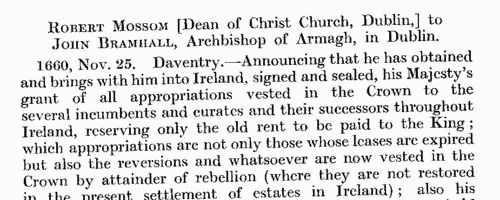
| Early settlers of Connecticut
(1636-1665)
The colony of Connecticut was settled in 1633 by emigrants from Massachusetts. The modern state of Connecticut also includes the colony of Newhaven. The seat of government of Connecticut was established in 1635 at Newtown (Hartford), on the site of a Dutch fort. The first volume of the Connecticut colony records is in three parts: 1, the records of the General and Particular Courts from April 1636 to December 1649; 2, Copy wills and probate inventories; 3, Grants and Conveyances of Lands, mostly from 1662 to 1690. The second volume of the records contains the minutes of the General Court from February 1650 to October 1669. In accordance with a resolution of the General Assembly, J. Hammond Trumbull transcribed the whole of the surviving court records as far as May 1665 (the union with Newhaven colony), with the probate material from 1640 to 1649, and these were published as 'The Public Records of the Colony of Connecticut' in 1850.RUGGE. Cost: £4.00.  | Sample scan, click to enlarge
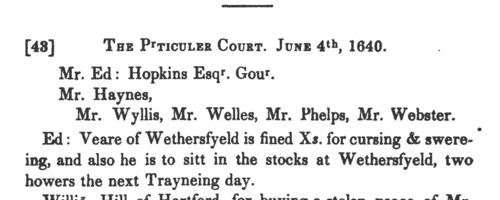
|  Apprentices registered in Bristol
(1755) Apprentices registered in Bristol
(1755)
Apprenticeship indentures and clerks' articles were subject to a 6d or 12d per pound stamp duty: the registers of the payments usually give the master's trade, address, and occupation, and the apprentice's name, as well as details of the date and length of the apprenticeship. There are central registers for collections of the stamp duty in London, as well as returns from collectors in the provinces. These collectors generally received duty just from their own county, but sometimes from further afield. The indentures themselves can date from a year or two earlier than this return. (The sample entry shown on this scan is taken from a Liverpool return. Each entry has two scans, the other being the facing page with the details of the indenture, length of service, and payment of duty.) IR 1/52RUGGE. Cost: £8.00.  | Sample scan, click to enlarge

| Deaths, Marriages, News and Promotions
(1776)
Death notices and obituaries, marriage and birth notices, civil and military promotions, clerical preferments, and bankrupts, as reported in the Gentleman's Magazine. Mostly from England and Wales, but items from Ireland, Scotland and abroad.
RUGGE. Cost: £4.00.  | Sample scan, click to enlarge

| Gloucestershire Freeholders and Tenants: Wotton-under-Edge
(1776)
The election of a knight of the shire to represent the county of Gloucester in Parliament began 6 May and continued until 17 May 1776, the Hon. George Cranfield Berkeley and William Bromley Chester, esq., being the candidates. The franchise was for adult males possessing freehold worth 40s or more per annum. This poll book lists all voters, arranged by hundred and then by township according to the place where their freehold lay. The voter's full name is given (surname first); place of abode; of what the freehold consists (such as messuage and lands); in whose tenure; and how his vote was cast.RUGGE. Cost: £6.00.  | Sample scan, click to enlarge

| Residents of Bournemouth
(1934)
Kelly's Directory of Bournemouth and Poole for 1934 includes this section listing private residents in Bournemouth, Branksome Park, Boscombe, Boscombe East, Ensbury, Ensbury Park, Pokesdown and Winton.RUGGE. Cost: £4.00.  | Sample scan, click to enlarge
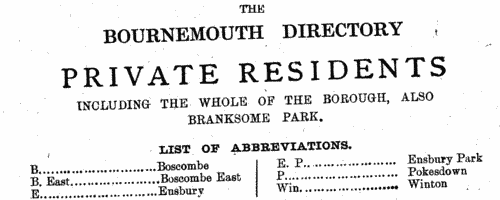
|
Research your ancestry, family history, genealogy and one-name study by direct access to original records and archives indexed by surname.
|













